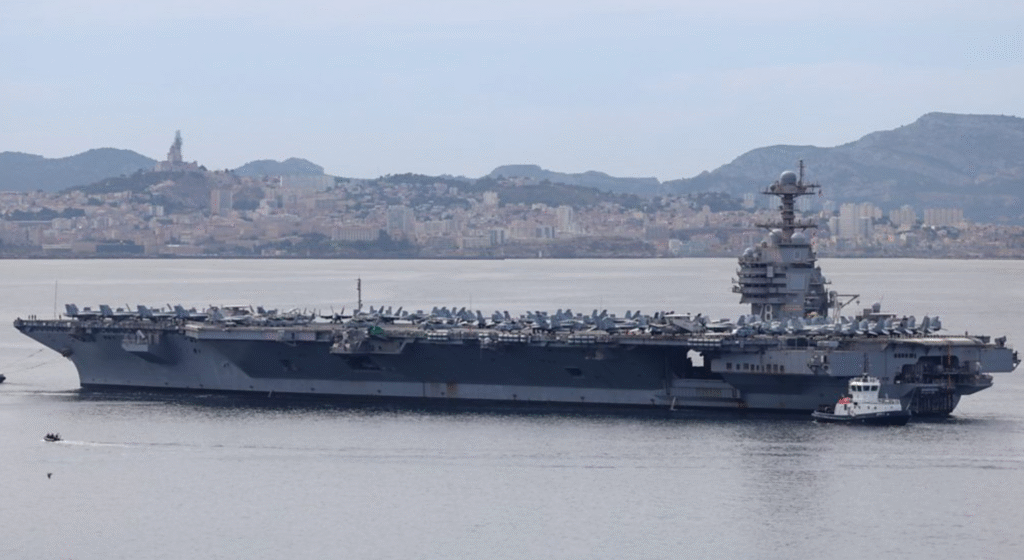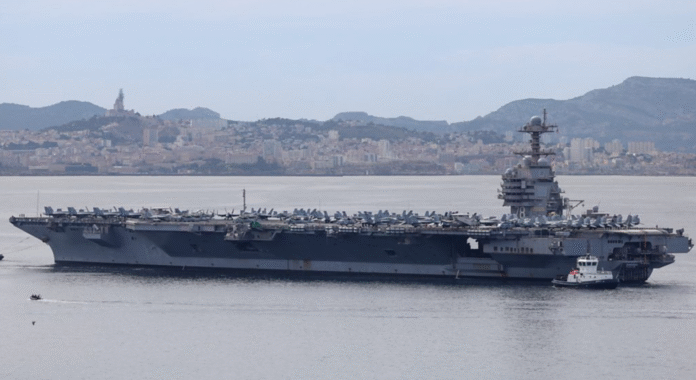The Venezuela Maduro US war tension has dramatically escalated as Venezuelan President Nicolás Maduro accused the United States of “fabricating a new war.” His remarks followed Washington’s decision to deploy the world’s largest warship, the USS Gerald R. Ford, to the Caribbean, a move that significantly boosts American firepower in the region and raises fears of an impending military confrontation.
The deployment, according to U.S. officials, is part of a broader campaign against narcotics trafficking. However, critics, including Maduro, see it as a cover for a more aggressive geopolitical maneuver aimed at destabilizing Venezuela’s leadership.

Venezuela Maduro US War Allegations Intensify
Speaking to state media, Maduro accused Washington of betraying its own promises to avoid further foreign conflicts. “They said they would never again get involved in war, and yet they are fabricating a new eternal war,” he said, denouncing what he called an “imperialist provocation.”
The Venezuela Maduro US war narrative gained traction after the U.S. launched 10 air strikes on vessels in the Caribbean, claiming to target drug traffickers. But Maduro insists these actions are politically motivated attempts to remove him from power, an accusation that has divided the international community.
U.S. President Donald Trump has long labeled Maduro a “drug trafficker,” accusing him of leading a narcotics empire, charges that Venezuela’s leader strongly denies.
USS Gerald R. Ford: The Power Behind the Pressure
At the heart of the Venezuela Maduro US war dispute is the USS Gerald R. Ford, the largest and most advanced aircraft carrier ever built. Capable of carrying 90 aircraft, the ship symbolizes unmatched U.S. military dominance.
According to Pentagon spokesperson Sean Parnell, the carrier’s deployment will “enhance existing capabilities to disrupt narcotics trafficking and dismantle transnational criminal organizations.”
Yet, the timing and scale of this move have drawn global scrutiny. Military analysts question why such an overwhelming force is required for anti-drug operations, suggesting instead that the mission’s real purpose could be to pressure Maduro’s regime or intimidate his military allies.
Tensions Rise as Trump Hints at ‘Land Action’
Fueling fears of a Venezuela Maduro US war, former U.S. President Donald Trump hinted at the possibility of direct intervention. “We are certainly looking at land now because we’ve got the sea very well under control,” he told reporters earlier this week.
Trump’s statement followed reports that U.S. air power in the region had expanded, with several military aircraft spotted across Puerto Rico. Sources cited by CNN revealed that Washington was considering targeted strikes on cocaine production facilities inside Venezuela, a move that could provoke a direct confrontation.
Maduro’s Reaction: ‘They Want Regime Change’
Maduro responded angrily to these developments, calling them a “clear attempt at regime change.” He accused Washington of using the drug war narrative to justify military aggression, echoing past U.S. interventions in Latin America.
“The U.S. has always fabricated excuses to attack nations that refuse to obey its empire,” Maduro declared. His comments reflect growing fears that Venezuela could become the next flashpoint in America’s foreign policy agenda.
The Venezuela Maduro US war controversy has reignited debates about sovereignty, international law, and the use of military force under the guise of anti-narcotics operations.
Regional Concerns and Global Reactions
Across Latin America, governments and analysts are expressing deep concern over what some call a “dangerous escalation.” Dr. Christopher Sabatini, senior fellow for Latin America at Chatham House, told the BBC that this military buildup “is about signaling, striking fear into the Venezuelan military and Maduro’s inner circle.”
He emphasized that this show of force may not lead to an invasion but aims to push internal actors toward removing Maduro themselves. “They’re not going to invade. The hope is psychological warfare,” Sabatini explained.
However, the Venezuela Maduro US war scenario has already caused regional anxiety, with several nations condemning the legality of the U.S. strikes.
Controversy Over U.S. Air Strikes
The Pentagon confirmed that “six male narco-terrorists” were killed in a recent operation in the Caribbean, linking them to the Tren de Aragua, a transnational criminal group based in Venezuela.
Still, questions remain about the legality of these operations. Members of the U.S. Congress, both Democrats and Republicans, have voiced concerns about the president’s authority to order such strikes without congressional approval.
Senator Rand Paul argued that “such military action requires congressional consent,” while 25 Democratic senators wrote to the White House demanding evidence that the targeted vessels posed an actual threat to the United States.
This legal debate underscores the broader Venezuela Maduro US war dilemma, whether Washington is acting within its rights or overstepping international boundaries.
Humanitarian and Political Implications
The situation is further complicated by Venezuela’s ongoing humanitarian crisis. The U.S. does not recognize Maduro’s government, considering the 2024 election fraudulent. Opposition tallies indicated a landslide victory for the opposition candidate, but the Maduro government retained control.
Critics argue that the U.S. military buildup risks worsening the suffering of Venezuelan civilians, many of whom are already facing severe shortages of food, medicine, and fuel.
For the Venezuelan leader, framing the issue as a Venezuela Maduro US war helps rally domestic support and portray Washington as the aggressor, a familiar strategy in his political playbook.
The Constitutional Debate in the U.S.
Back in Washington, former U.S. State Department lawyer Brian Finucane told the BBC that the ongoing operations represent “a constitutional crisis.” He stated, “Congress has principal control over the use of military force. That control has been usurped by the White House.”
Despite these concerns, the Republican-controlled Congress has shown little appetite to challenge the executive branch. This political paralysis leaves open the question of whether the U.S. could escalate its military engagement without formal approval, something that would dramatically shift the Venezuela Maduro US war dynamics.

Will the Conflict Escalate or Subside?
Experts remain divided on how far the confrontation could go. Some see this as a calculated show of power, while others fear it could spiral into direct conflict.
The USS Gerald R. Ford’s presence near Venezuela sends a clear message: Washington is willing to apply pressure. But whether this results in negotiations, sanctions, or a military clash depends largely on the next moves from both leaders.
For now, the Venezuela Maduro US war debate serves as a stark reminder of how fragile peace in the Caribbean remains, and how easily diplomacy can give way to force when national interests collide.

